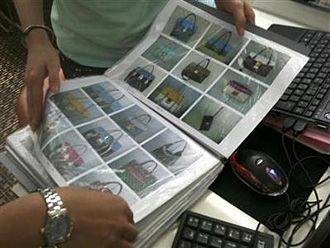
|  |  |  Technology News Technology News  
Faked in China: Inside the Pirates' Web - Part 4
 Doug Palmer & Melanie Lee - Reuters Doug Palmer & Melanie Lee - Reuters
go to original
October 26, 2010


| | A customer looks through a catalogue of fake foreign brand handbags in a store at Baiyun World Leather Market in the southern Chinese city of Guangzhou, September 29, 2010. (Reuters/Tyrone Siu) |  |
Few if any foreigners are ever caught or prosecuted, and not many locals, either. China's counterfeit industry employs millions of workers, distributors and shop clerks across the nation, one reason why authorities have often been half-hearted in their enforcement measures.

But last week, the government said it would soon launch a six-month crackdown on piracy and trademark infringement. The illicit traders "upset the market's normal order, impair the competitive strength and innovation of businesses, and hurt China's image abroad," the State Council, or Cabinet, said in a statement.

In the second half of last year, China's customs department seized 2.6 million counterfeit items from the country's postal and express consignments, Meng Yang, a director general in the customs department, said in a speech in Shanghai last month.

That's probably just a small fraction of the total trade in China, experts say, given the amount of fake merchandise from China seized abroad.

NEW WEAPONS AGAINST PIRATES

Back in Washington, I handed over the fake Louis Vuitton bag down to the National Intellectual Property Rights Coordination Center. Federal agents, standing in front of a display case of counterfeit shampoo, condoms, medicine and other products seized over the years, good-naturedly accept the bag. They said it was much better quality than the ones they had brought in to show me.

The new center is a partnership among a dozen federal law enforcement agencies and the Mexican government. Richard Halverson, its chief for outreach and training, said U.S. customs officials and postal inspectors have been on the lookout for counterfeit goods from China, but can't catch every one.

The money to be made selling counterfeit goods is so good "we have seen organized crime groups, what you would consider drug trafficking groups, actually move away from some of those other crimes into the counterfeit goods trade because it is a high-profit, low-risk cash business - the prime things that criminals are looking for," Halverson said.

It may seem harmless enough, but a consumer surfing the web looking for a good deal on prescription drugs, for example, needs to beware. "You may be looking at what you believe to be a Canadian pharmacy, when in fact the drugs are being manufactured in India, the site is being run out of China, and your payment is going to another group in Russia," Halverson said.

In the 2009 budget year, U.S. Customs agents and other officials made 14,481 seizures valued at $260.7 million dollars. When the final tally for 2010 budget year is in, the figures will be much higher, Halverson said, noting that in just one operation U.S. agents in Baltimore working with London police seized eight containers of counterfeit shoes and handbags.

One recent IPR Center enforcement action, called "Operation in Our Sites" seized the domain names of seven websites that allow visitors to stream or illegally download first-run movies, often just within hours of hitting the theaters.

Halverson took me to the IPR's operations room, where undercover agents search out websites and plot ways to disrupt them. The room, with a huge video monitor on the far wall, also functions as a command post to run operations in the field.

"Our undercover operation here is just Internet-based. We don't have any face-to-face meetings," one agent said, explaining they use "undercover computers" that allow them to trawl for counterfeiters without being identified.

After making a buy and confirming it is a counterfeit item, ICE agents will get a court order to seize the site's domain name and shut it down. But a longer criminal investigation is required to seize assets and put people in jail, the agent said.

Many owners of the domain names, such as Ericwhy, are overseas, making it difficult for U.S. law enforcement to go after them. So often the most viable option is to close the site, another agent said.

|

 |
|  |



